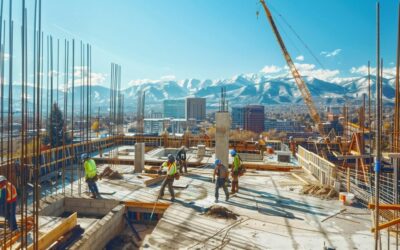You might not realize it at first, but your concrete surfaces can tell you a lot about their installation quality. If you’ve noticed cracks, uneven areas, or even water pooling, these signs indicate potential problems that could escalate over time. Understanding the impact of these issues is crucial for maintaining your property’s value. Fortunately, Denver contractors have effective solutions to address these concerns. So, what do they recommend for fixing these common problems, and how can you ensure your concrete lasts for years to come?
Common Signs of Poor Installation
When you inspect a newly installed concrete surface, there are several telltale signs that indicate poor installation.
First, look for obvious cracks or uneven surfaces; these can suggest inadequate curing or improper mixing.
If you notice a rough texture or pitting, it might mean the finish wasn’t applied correctly.
Additionally, check for discoloration, which can signal issues with the mixing process or the use of subpar materials.
You should also be wary of water pooling in certain areas, indicating poor drainage or improper grading.
Lastly, if the edges of the concrete are crumbling or flaking, it’s a clear sign that the installation wasn’t performed according to industry standards.
Recognizing these signs early can save you from future headaches.
Impact of Cracks and Damage
Cracks and damage in concrete surfaces can lead to serious problems down the line, affecting both safety and aesthetics. When you notice cracks, it’s essential to act quickly.
Small fissures can expand, compromising the structural integrity of your concrete and posing safety hazards. You might also experience water infiltration, which can worsen the damage over time.
Aesthetically, unsightly cracks can diminish your property’s curb appeal, making it less inviting for guests or potential buyers. Additionally, uneven surfaces may create tripping hazards, increasing liability risks.
By addressing these issues promptly, you not only enhance safety but also preserve the value and appearance of your concrete surfaces.
Don’t wait until it’s too late; take action to mitigate further damage.
Importance of Proper Drainage
Ensuring proper drainage is crucial to maintaining the integrity of your concrete surfaces. When water accumulates, it can lead to serious issues like cracks, erosion, and even structural damage.
If you notice puddles or water pooling around your concrete, it’s a sign that drainage isn’t functioning as it should. This can compromise not just the appearance of your concrete, but its longevity too.
Proper drainage channels water away from the surface, preventing moisture from seeping in and causing deterioration. By addressing drainage issues early on, you can save yourself from costly repairs and maintain the durability of your concrete.
Always keep an eye on how water flows around your property to ensure your concrete remains in top shape.
Solutions Offered by Denver Contractors
If you’re facing issues with poor concrete installation, Denver contractors offer a range of effective solutions to tackle these challenges head-on.
They can assess the situation and identify the root causes—be it drainage issues, cracks, or uneven surfaces. Once the problems are pinpointed, contractors often recommend techniques like resurfacing to fix minor imperfections or mudjacking to raise and level sunken slabs.
For more serious issues, they might suggest complete removal and replacement of the concrete. Additionally, they can provide proper sealing and reinforcement methods to enhance durability.
Preventive Measures for Future Projects
To prevent issues with concrete installation in future projects, it’s crucial to prioritize proper planning and execution from the start.
Begin by selecting a reputable contractor with proven experience in concrete work. Schedule a site assessment to identify potential challenges, like drainage issues or soil conditions, that could impact the installation.
Always use high-quality materials, and ensure the mix is appropriate for your specific project. Pay attention to weather conditions during installation; extreme temperatures can affect curing.
Finally, promote ongoing communication with your contractor throughout the process to address any concerns immediately.
Frequently Asked Questions
How Can I Identify Poor Concrete Installation Before It Cracks?
To identify poor concrete installation, check for uneven surfaces, excessive dust, or scaling.
You can also look for cracks forming soon after installation. Observing these signs early can help prevent more significant issues later on.
What Materials Are Best for Durable Concrete Installations?
For durable concrete installations, you’ll want to use high-quality cement, aggregates, and additives.
Reinforcement materials like rebar or wire mesh also help enhance strength and longevity, ensuring your project withstands the test of time.
How Long Should a Concrete Installation Last if Done Correctly?
If done correctly, you can expect your concrete installation to last 25 to 30 years.
Proper maintenance and care can extend its lifespan even further, ensuring it remains strong and visually appealing over time.
Are There Warranties Available for Concrete Installation Services?
Yes, many concrete installation services offer warranties.
These warranties typically cover defects and ensure your investment is protected.
It’s important to ask the contractor about their warranty terms before starting your project for peace of mind.
Can I Repair Poorly Installed Concrete Myself?
You can attempt to repair poorly installed concrete yourself, but it’s tricky.
You’ll need the right tools and materials. If you’re unsure, consider consulting a professional to ensure a lasting fix without further issues.
Conclusion
If you notice cracks, uneven surfaces, or water pooling around your concrete, it’s time to take action. These signs indicate poor installation that can lead to bigger problems down the road. Fortunately, Denver contractors offer effective solutions to fix these issues and ensure your concrete lasts. By addressing these concerns and taking preventive measures, you can safeguard your investment and maintain the value of your property. Don’t wait—get your concrete assessed today!



